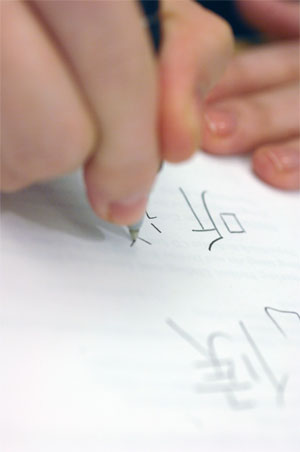 |
| "Every word is like a picture" says Dr. Luo of the Mandarin language (Danny Abriel photo) |
Wrapping your tongue around Mandarin can be tricky. As a tonal language, one word’s sound can mean four different things, depending on how you say it. So, “ma” can mean “mother,” “hemp,” “horse” or “to curse.”
“That’s what makes it such a fascinating language to learn,” says Shao-Pin Luo, assistant professor at pilipiliÂţ». “If you get the tone wrong, it could be a disaster.”
But more and more students are willing to try. Dalhousie’s first Mandarin class was offered three years ago. Starting in September, Dalhousie will offer four Mandarin classes: two at the beginner level, one at intermediate and a new advanced class.
“China’s really hot right now, with its dynamic economy and the Olympics taking place in the summer,” says Dr. Luo. “Because of China’s economic power and political influence, people are paying attention to China and wanting to learn more about its language and culture.”
Dr. Luo integrates Chinese customs, songs, food and culture into her Mandarin classes. And for students who want more practice, there’s the Chinese Conversation Circle Wednesday afternoons in the second-floor lounge of the McCain Building. There’s usually a pot of tea and someone brings snacks.
The students’ interests extend beyond the language. “Last year, some of my students participated in the Chinese New Year celebrations,” says Dr. Luo. “They put on a fashion show, did some Chinese tongue twisters, recited classical Chinese poetry, played traditional Chinese music, and demonstrated martial arts.”
Kate Dalgleish, a political science major who drops by the Chinese Conversation Circle, says learning Mandarin is bound to come in handy.“There’s over a billion people who speak the language so why not learn it?” says Ms. Dalgleish.
“(Mandarin) is different – it’s very visual and every word is a picture. That can be challenging but totally possible to learn,” says Dr. Luo, a native Chinese speaker who did her bachelor’s degree at Jilin University in China, her master’s degree at Lamar University in Texas and her PhD in English Literature at the University of New Brunswick. “Students have gone on to work, teach, and travel in China and various other parts of Asia.”
Dr. Luo hopes to expand offerings further with courses in Asian cinema, Chinese literature and culture, and possibly a business Chinese language class. The Mandarin program is administered through the Department of Russian.
Stephanie Smith is majoring in international development studies.
